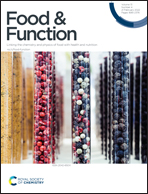Gardenia jasminoides J. Ellis extract alleviated white matter damage through promoting the differentiation of oligodendrocyte precursor cells via suppressing neuroinflammation†
Abstract
Increasing evidence has highlighted the role of white matter damage in the pathology of Alzheimer's disease (AD). Previous research has shown that a mixture of crocin analogues (GJ-4), Gardenia jasminoides J. Ellis extract, improved cognition in several AD mouse models, but the mechanism remains unclear. The aim of the present study was to investigate the effects and underlying mechanisms of GJ-4 on white matter damage. Proteomic analysis and western blotting results suggested that the level of myelin-related proteins, including myelin basic protein (MBP), myelin associated glycoprotein (MAG) and myelin associated oligodendrocyte basic protein (MOBP), was significantly decreased in the brain of PrP-hAβPPswe/PS1ΔE9 (APP/PS1) transgenic mice, and GJ-4 treatment increased the expressions of these proteins. This result revealed that GJ-4 could ameliorate myelin injury, suggesting that this might be a possible mechanism of GJ-4 on cognition. To validate the effects of GJ-4 on myelin, a metabolite of GJ-4, crocetin, which can pass through the blood–brain barrier, was applied in in vitro experiments. A mechanistic study revealed that crocetin significantly promoted the differentiation of primary cultured oligodendrocyte precursor cells to oligodendrocytes through up-regulation of nuclear Ki67 and transcription factor 2 (Olig2). Oligodendrocytes, the myelin-forming cells, have been reported to be lifelong partners of neurons. Therefore, to investigate the effects of crocetin on myelin and neurons, lysophosphatidylcholine (LPC)-treated primary mixed midbrain neuronal/glial culture was used. Immunofluorescence results indicated that crocetin treatment protected neurons and suppressed microglial activation against LPC-induced injury. To further discern the effects of GJ-4 on white matter injury and neuroinflammation, an LPC-induced mouse model was developed. GJ-4 administration increased oligodendrocyte proliferation, differentiation, and myelin repair. The mechanistic study indicated that GJ-4 improved white matter injury through the regulation of neuroinflammatory dysfunction. These data indicated that GJ-4 effectively repaired white matter damage in the LPC-treated mice. Thus, the present study supported GJ-4 as a potential therapeutic agent for AD and white matter related diseases.



 Please wait while we load your content...
Please wait while we load your content...